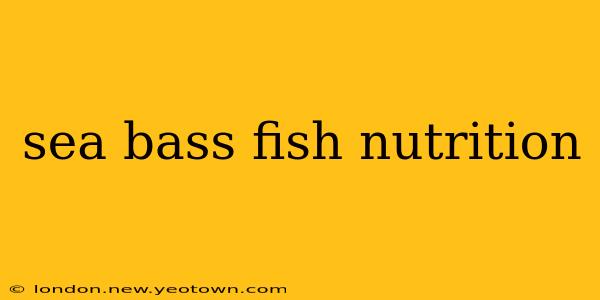The shimmering scales, the firm, flaky flesh – sea bass is a culinary star for good reason. But beyond its delicious taste, this popular fish boasts a remarkable nutritional profile, making it a healthy and flavorful addition to any diet. Let's dive deep into the world of sea bass nutrition and uncover why it's a favorite among health-conscious eaters and chefs alike.
What are the Nutritional Benefits of Sea Bass?
Sea bass is a powerhouse of nutrients. A single serving is packed with protein, essential fatty acids, vitamins, and minerals, contributing significantly to overall health and well-being. The specific nutritional content can vary slightly depending on the species and its environment, but generally, you can expect a rich source of:
-
High-Quality Protein: Sea bass is an excellent source of lean protein, crucial for building and repairing tissues, supporting immune function, and maintaining healthy muscles. This makes it a perfect choice for athletes, growing children, and anyone looking to boost their protein intake.
-
Omega-3 Fatty Acids: These essential fats are vital for brain health, heart health, and reducing inflammation throughout the body. Sea bass is a good source of EPA and DHA, two particularly beneficial types of omega-3s.
-
Vitamins and Minerals: Sea bass is a good source of several essential vitamins and minerals, including vitamin D (important for bone health and immune function), vitamin B12 (essential for nerve function and red blood cell formation), niacin (contributes to energy metabolism), and selenium (a powerful antioxidant). It also contains smaller amounts of other vital nutrients like potassium and phosphorus.
Is Sea Bass Good for Weight Loss?
Can sea bass help with weight management? Yes, the high protein content in sea bass contributes to satiety, helping you feel full and satisfied for longer, potentially reducing overall calorie intake. Its relatively low fat content also makes it a smart choice for those watching their weight. Remember, a balanced diet and regular exercise are key components of any successful weight loss plan.
What are the Different Types of Sea Bass?
What are the different types of sea bass and how does their nutrition compare? Several species are commonly referred to as "sea bass," and their nutritional profiles can vary somewhat. European sea bass, Chilean sea bass (also known as Patagonian toothfish), and Asian sea bass are among the most popular. While the differences are subtle, the overall nutritional benefits generally remain consistent across these species, with variations in fat content and omega-3 levels being the most noticeable.
How Many Calories are in Sea Bass?
How many calories are in a serving of sea bass? The calorie count per serving varies depending on the preparation method and serving size. Generally, a 3-ounce serving of baked or grilled sea bass contains approximately 100-150 calories. Added fats or heavy sauces can significantly increase the calorie count.
Is Sea Bass a Good Source of Omega-3s?
Is sea bass a good source of Omega-3 fatty acids? Yes, sea bass is a good source of omega-3 fatty acids, particularly EPA and DHA. These essential fatty acids offer numerous health benefits, contributing to heart health, brain function, and reducing inflammation. However, the exact amount of omega-3s can vary depending on the species and its diet.
What are the potential health risks associated with eating Sea Bass?
Are there any potential health risks associated with eating sea bass? While generally considered a healthy fish, there are some potential considerations. Mercury levels can vary in different species of fish, and some larger sea bass species might contain higher levels. Additionally, individuals with seafood allergies should exercise caution. It's always best to source your sea bass from reputable suppliers and practice safe food handling techniques.
Sea bass offers a delicious and nutritious way to incorporate more seafood into your diet. Its rich nutrient profile supports various aspects of health, making it a versatile and valuable addition to a balanced lifestyle. Remember to choose sustainably sourced sea bass to minimize your environmental impact and enjoy this culinary treasure responsibly.

